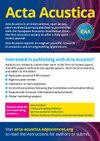On the identification and assessment of underlying acoustic dimensions of soundscapes
IF 1.4
3区 物理与天体物理
Q4 ACOUSTICS
引用次数: 2
Abstract
The concept of soundscapes according to ISO 12913-1/-2/-3 proposes a descriptive framework based on a triangulation between the entities acoustic environment, person and context. While research on the person-related dimensions is well established, there is not yet complete agreement on the relevant indicators and dimensions for the pure description of acoustic environments. Therefore, this work attempts to identify acoustic dimensions that actually vary between different acoustic environments and thus can be used to characterize them. To this end, an exploratory, data-based approach was taken. A database of Ambisonics soundscape recordings (approx. 12.5 h) was first analyzed using a variety of signal-based acoustic indicators (Ni = 326) within the categories loudness, quality, spaciousness and time. Multivariate statistical methods were then applied to identify compound and interpretable acoustic dimensions. The interpretation of the results reveals 8 independent dimensions “Loudness”, “Directivity”, “Timbre”, “High-Frequency Timbre”, “Dynamic Range”, “High-Frequency Amplitude Modulation”, “Loudness Progression” and “Mid-High-Frequency Amplitude Modulation” to be statistically relevant. These derived latent acoustic dimensions explain 48.76% of the observed total variance and form a physical basis for the description of acoustic environments. Although all baseline indicators were selected for perceptual reasons, validation must be done through appropriate listening tests in future.论声景的底层声学维度的识别与评价
根据ISO 12913-1/-2/-3,声景的概念提出了一个基于实体声环境、人和环境之间的三角测量的描述性框架。虽然对人相关维度的研究已经建立,但对于声环境的纯粹描述的相关指标和维度尚未完全达成一致。因此,这项工作试图识别不同声学环境之间实际变化的声学尺寸,从而可以用来表征它们。为此目的,采取了一种探索性的、基于数据的办法。一个关于立体声声景录音的数据库。12.5 h)首先使用各种基于信号的声学指标(Ni = 326)在响度、质量、空间和时间类别中进行分析。然后应用多元统计方法来识别复合和可解释的声学尺寸。通过对结果的解释,发现响度、指向性、音色、高频音色、动态范围、高频调幅、响度级数和中高频调幅这8个独立维度具有统计学相关性。这些推导出的潜在声学维数解释了观测到的总方差的48.76%,并为声环境的描述提供了物理基础。虽然所有基线指标的选择都是出于感知原因,但必须通过适当的听力测试来验证。
本文章由计算机程序翻译,如有差异,请以英文原文为准。
求助全文
约1分钟内获得全文
求助全文
来源期刊

Acta Acustica
ACOUSTICS-
CiteScore
2.80
自引率
21.40%
发文量
0
审稿时长
12 weeks
期刊介绍:
Acta Acustica, the Journal of the European Acoustics Association (EAA).
After the publication of its Journal Acta Acustica from 1993 to 1995, the EAA published Acta Acustica united with Acustica from 1996 to 2019. From 2020, the EAA decided to publish a journal in full Open Access. See Article Processing charges.
Acta Acustica reports on original scientific research in acoustics and on engineering applications. The journal considers review papers, scientific papers, technical and applied papers, short communications, letters to the editor. From time to time, special issues and review articles are also published. For book reviews or doctoral thesis abstracts, please contact the Editor in Chief.
 求助内容:
求助内容: 应助结果提醒方式:
应助结果提醒方式:


